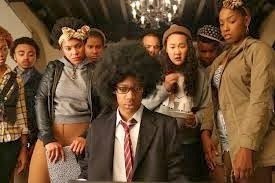Mark Anthony Neal's Blog, page 842
January 29, 2014
New Video * The Foreign Exchange: "Better" feat. Eric Roberson & Shana Tucker
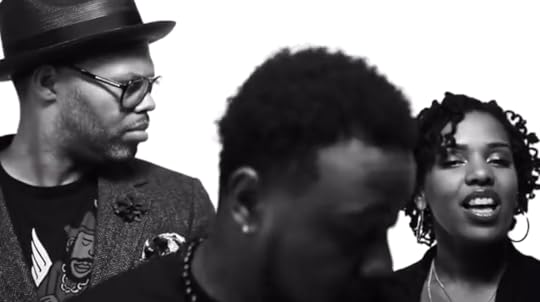 The Foreign Exchange ft. Eric Roberson & Shana Tucker--"BETTER"
The Foreign Exchange ft. Eric Roberson & Shana Tucker--"BETTER"Directed by Kenneth Price
Love in Flying Colors
+ FE Music
Published on January 29, 2014 05:55
January 28, 2014
#BarackTalk: 2014 State of the Youth w/ Phil Agnew of the Dream Defenders
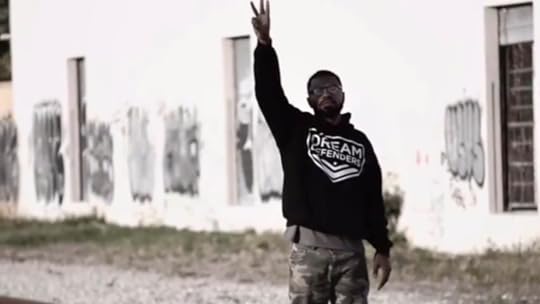 League of Young Voters
League of Young VotersOn January 28th, Phil Agnew of the Dream Defenders delivers the first ever State of the Youth Address, outlining the social justice priorities of millions of young voters.
Published on January 28, 2014 19:43
Making Jay Z ‘Eat the Cake’ by Mark Anthony Neal
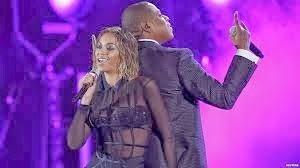 Making Jay Z ‘Eat the Cake’
by Mark Anthony Neal | NewBlackMan (in Exile)
Making Jay Z ‘Eat the Cake’
by Mark Anthony Neal | NewBlackMan (in Exile)For a moment, imagine if Phineas Taylor Barnum & James Anthony Bailey—the proprietors of the Barnum & Bailey Circus—were involved in a long-term same-gender loving relationship, in which their private lives, by necessity and invention, broached their public business of creating the “greatest show on earth.”
To think of Beyonce Knowles-Carter and Shawn Carter as the Barnum & Bailey of the early 21st century should not count as either critique or affirmation. The duo sells “entertainment” at the highest levels, where their fantasies (and ours) about what might or might not occur in their private and not-so-private sexual lives is open for mass consumption on multiple platforms; the “greatest show in bed” apparently.
But let’s be clear, we do not know any more about Ms. Knowles-Carter and Mr. Carter’s lives than they allow us to believe—and even desire. To think that there aren’t long-term sexual partners, married or un-married, who do not desire the spectacle of sex that Ms. Knowles-Carter and Mr. Carter have packaged sonically and visually, and most recently on the Grammy stage, is to miss what has always been one of America’s most bountiful cash-and-carry commodities.
How else do you explain CBS’s decision to broadcast a Cinemax late-night exclusive at the top of the 8:00 pm hour on a Sunday? I’m no prude—I’m all for consuming sexual desire—just wasn’t quite prepared to explain to the 11-year-old what “Beyonce” was doing on that chair and why she was wet. Though it should not go without remark, that we’ve never seen two grown married Black Americans in that space, in that way, and with so much spectacle. Black folk have rarely been allowed to be fully grown and fully sexual—or raunchy, even inappropriately so—on national television in prime-time.
Yet the reality of who Ms. Knowles Carter and Mr. Carter are, as grown married Black Americans, speaks palpably to the challenge of being who they are, and wanting to extend their respective brands in an era in which they, and the married Black American couple currently living in the White House, are the most visible and consumed married Black Americans in the world.
Of course Mr. Carter has a responsibility to present language that’s a little more precise , that doesn’t simply rely on a well-worn trope from a film that was released 21-years ago, if he’s going to sell that fantasy of a drunken, raunchy and presumably consensual and recurring sexual encounter with a long-term partner.
To be sure, the centering of Tina Turner in this moment with regards to Mr. Carter’s “eat the cake, Annie Mae” lyric from What’s Love Got to Do with It? (1993), the film adaptation of Ms. Turner’s autobiography I, Tina (1986), may have less to do with Ms. Turner and more to do with our own triggers. The scene in the film is a choreographed and highly stylized fictional account of one of a series of acts of domestic partner violence by the late Ike Turner, that occurred almost two decades before they appear on screen—or 40 years ago.
Notably the dramatic physical violence that occurs in that scene did not happen, though that doesn’t make Mr. Turner’s insistence that Ms. Turner “eat the cake” any less abusive. Ms. Turner has likely, long made peace with the depictions of violence in the film, though not necessarily the real violence that occurred in her marriage to Mr. Turner.
Nevertheless the line about “eating the cake” has long been bandied about in Black popular culture, particularly in the comic realm, to the point it might be thought of as public domain. What makes Mr. Carter’s use such an issue at this point?
What’s Love Got to Do with It was released at a moment when African-American marriages were thought to be fraying—the beginnings of the social panic around the DL—and the very concept of the Black family was under assault. This most memorable scene from the film—released a year after the good Huxtables went gently into the good night—became one of the most visible examples of the so-called pathology and “Crisis of Black Male-Black Female Relations,” as hundreds of on-campus forums would attest throughout the decade of the 1990s.
What gets triggered in Mr. Carter’s citation of movie dialogue, is not only the reality of domestic partner violence, but also our anxieties about Black marriage, as embodied by figures like Ms. Knowles Carter and Mr. Carter.
The idea of Beyonce and Jay Z is as much a fantasy as “Drunk in Love.” We may never know what exactly Ms. Knowles-Carter and Mr. Carter’s intents were with the song or why they fully felt the need to share as they have. Though many have read Ms. Knowles Carter’s deliberate lining of her husband lyrics when he performed the controversial verse during the Grammy performance as some co-signing of domestic partner violence, it seems more likely that she was simply closing ranks around her husband who has been scoured—and perhaps, deservedly so—for his lyric.
Yet do we think that Mr. Carter is any more culpable here than Lawrence Fishburne was for performing the late Mr. Turner’s acts of violence? If public opinion is a barometer, then Mr. Carter may have to eat his own cake.
***
Mark Anthony Neal is Professor of African & African American Studies at Duke University. The author of several books including the recently published Looking for Leroy: Illegible Black Masculinities(NYU Press, 2013), Neal is also the co-editor of the acclaimed That’s the Joint: The Hip-Hop Studies Reader (Routledge), now in its second edition. Neal is the host of the weekly webcast Left of Black, which is produced in conjunction with the John Hope Franklin Center for Interdiciplinary and International Studies at Duke. You can follow Neal on Twitter at @NewBlackMan
Published on January 28, 2014 11:58
January 27, 2014
HuffPost Live: Did Macklemore Get The Award Kendrick Lamar Deserved?
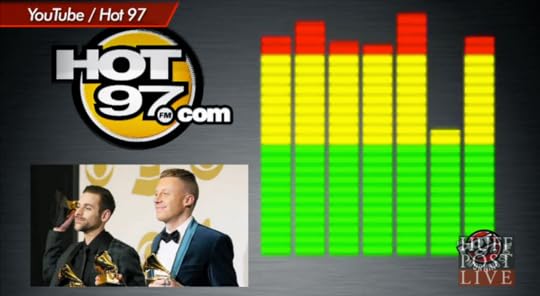
Huffpost Live
Macklemore swept the rap categories at Sunday's Grammy Awards, winning Best Rap Song, Best Rap Performance and Best Rap Album. But, the sweep set off a passionate debate online, with many claiming Kendrick Lamar was robbed. What do you think?Hosted by: Marc Lamont HillGuests:Brian Miller @bdottm (New York, NY) Content Director at Rap RadarDatwon Thomas @Daydog (New York, NY) Contributing Editor at Ozy.comJamilah King @jamilahking (New York, NY) News Editor and Media Reporter at Colorlines
Published on January 27, 2014 21:47
Tell Me More: 'Dear White People' A Hit At Sundance
Published on January 27, 2014 16:03
Left of Black S4:E17: The Role of Black Barbers from Slavery until the Civil Rights Era
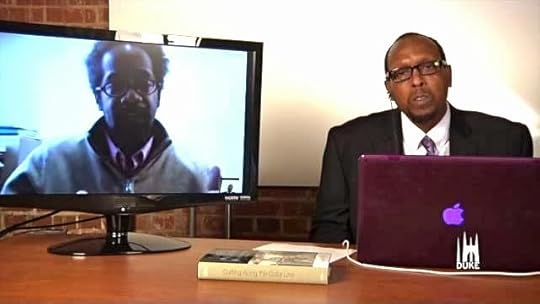 Left of Black S4:E17: The Role of Black Barbers from Slavery until the Civil Rights Era
Left of Black S4:E17: The Role of Black Barbers from Slavery until the Civil Rights Era
Left of Black host and Duke University Professor Mark Anthony Neal is joined via Skype by Professor Quincy T. Mills , author of Cutting Along the Color Line: Black Barbers and Barber Shops in America (University of Pennsylvania Press). Mills, a Professor of History at Vassar College, reveals the unique role that Black barbers have played in the cultural, economic and political life of Blacks since Slavery.
Left of Black is a weekly Webcast hosted by Mark Anthony Neal and produced in collaboration with the John Hope Franklin Center at Duke University.
Episodes of Left of Black are also available for free download in @ iTunes U
Follow Left of Black on Twitter: @LeftofBlackFollow Mark Anthony Neal on Twitter: @NewBlackManFollow Quincy T. Mills on Twitter: @QuincyTMills
Published on January 27, 2014 14:54
Bill Moyers on Dark Money, the Attack on Voting Rights & How Racism Still Drives Our Politics
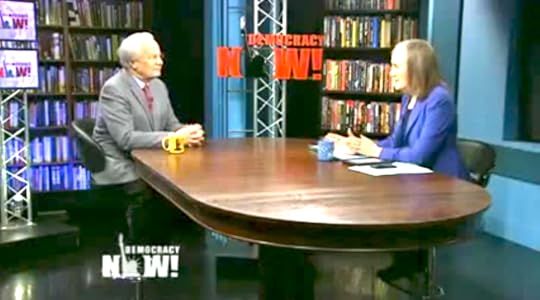 Democracy Now
Democracy NowLegendary broadcaster Bill Moyers joins us to discuss his latest investigation which explores how the influence of large, untraceable political donations known as "dark money" have become the greatest threat to democracy in the United States.
Published on January 27, 2014 12:17
Anthem: Social Movements and the Sound of Solidarity in the African Diaspora * The Mixtape by Shana L. Redmond + The Dreadstar Movement
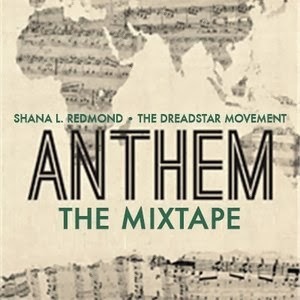
Anthem by Thedreadstarmovement on Mixcloud
Shana L. Redmond:
Anthem: Social Movements and the Sound of Solidarity in the African Diaspora reveals how this genre, emblematic of Black solidarity and citizenship, contributed to the growth and mobilization of the modern, Black citizen. Tracing key compositions and performances—from James Weldon Johnson’s “Lift Ev’ry Voice and Sing” that mobilized the NAACP to Nina Simone’s “To Be Young, Gifted & Black” which became the Black National Anthem of the Congress of Racial Equality (CORE)—Anthem develops a robust recording of Black social movements in the 20th century.
This mixtape is a soundscape for the book, allowing for Black life and history to be displayed and contested through sound. Highlighting the songs analyzed in the text, as well as other relevant songs and speeches, the mixtape provides a sonic context for the complex reading of racial and political formations performed through the analysis of the composition, performance, and uses of Black anthems.
Published on January 27, 2014 06:15
Growing Up 'White,' Transracial Adoptee Learned To Be Black
Published on January 27, 2014 03:57
January 26, 2014
MHP Show: Harry Belafonte on Using Artists to Fight Unjust Systems
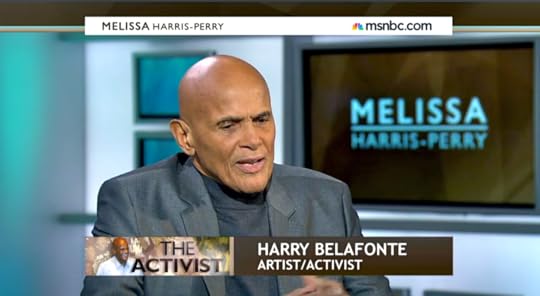 MHP Show
MHP ShowActor, activist and humanitarian Harry Belafonte talks with Melissa Harris-Perry about how artists and celebrities can use their voice to fight social injustice.
Published on January 26, 2014 10:28
Mark Anthony Neal's Blog
- Mark Anthony Neal's profile
- 30 followers
Mark Anthony Neal isn't a Goodreads Author
(yet),
but they
do have a blog,
so here are some recent posts imported from
their feed.


